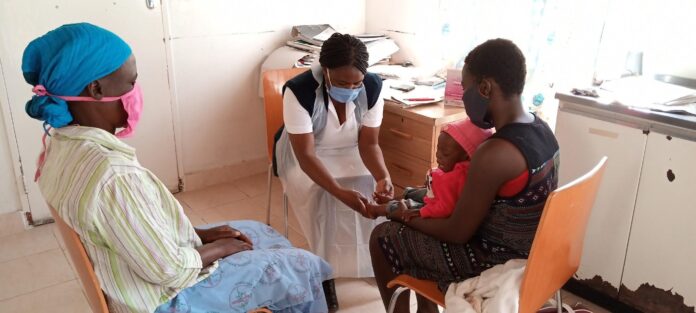For Chiedza’s 20-month-old daughter, Caroline, the urgent provision of Plumpy Nut was the fine line between life and potential death after she was screened and found to have Severe Acute Malnutrition (SAM).
SAM is the most extreme and visible form of undernutrition. A child suffering from SAM – often frail and skeletal – requires urgent treatment to survive. Malnutrition can make a child more susceptible to infection, and infection also contributes to malnutrition. Malnutrition is one of the major complications of HIV infection and a significant factor in advancing the disease.
Many children living with HIV suffer from severe acute malnutrition. To increase their chances of survival, these children need therapeutic foods to urgently treat malnutrition, combined with antiretroviral treatment to stop the disease from progressing.
Plumpy Nut is a peanut-based ready-to-use therapeutic food (RUTF) that has helped save the lives of thousands of malnourished children in Zimbabwe.
HIV Testing and TB screening in children is easily conducted in children who present with malnutrition. UNICEF supports voluntary and confidential HIV testing to women and their children in pregnancy and at any point in childhood.
Chiedza, a 20-year-old young mother from Manicaland’s Makoni District in north-eastern Zimbabwe has been affected by the economic and social shocks caused by the COVID-19 pandemic. لعبة الحظ بالارقام She lost her only source of income working as a domestic worker in the capital, Harare.
Losing her job meant that she could not feed baby Caroline with the appropriate, adequate , safe and nutritious complementary foods– resulting in the child wasting and developing severe acute malnutrition.
“I went to Harare to look for a job while I was pregnant. I had no husband to support me and after delivery I often left baby Caroline in the care of neighbours while I worked as a maid. I could only return home to the baby in the evenings. The baby became sickly and I had to return to Makoni to ask for help from my uncle and aunt,” she explained. لعبة ليدو الحقيقية
With the help of a Village Health Worker who was consulted by Chiedza’s aunt, a Mid-upper Arm Circumference (MUAC) assessment was done that determined that baby Caroline had acute malnutrition.
MUAC assessment is a quick and simple way to determine whether or not a child is malnourished using a simple coloured plastic strip that measures the babies mid upper arm and grades the nutrition status of the child.
Chiedza visited Katsenga clinic for the screening for Oedema in her 20 months old daughter, Caroline, who was referred with Severe Acute Malnutrition.
Organization for Public Health Interventions and Development (OPHID)
Chiedza was referred to Katsenga clinic in Makoni where two nurses who had received mentorship and support through the Organization for Public Health Interventions and Development (OPHID), a UNICEF supported humanitarian emergency response project, helped baby Caroline.
OPHID implements the UNICEF emergency response project which seeks to make sure that every child in Makoni District is actively screened for malnutrition and those identified with acute malnutrition are referred to the nearest health facility for management of malnutrition, HIV and TB screening.
The nurses performed an appetite test on the baby and she was able to finish a quarter of a sachet of Plumpy Nut and thereafter admitted to the outpatient treatment program and put on treatment of two sachets per day. الدمبلة
The nurses tested the child for HIV and screened her for TB. She was found to be negative making her chances of survival, good. She would be able to be treated as an outpatient.
Plumpy Nut or Ready to Use Therapeutic Food (RUTF) is used to treat acute malnutrition. It supports rapid weight gain derived from broad nutrient intake which can alleviate a starving child from impending illness or death. The product is easy for children to eat because it dispenses readily from a durable, tear-open package and tastes good.
Chiedza was grateful for the help she was given at the clinic.
“If I had stayed in Harare, I would have lost my baby.” Chiedza said. “My aunt and uncle have helped me so much and now the nurses have treated Caroline and my baby has been saved.”
Lifesaving interventions
OPHID and UNICEF’s emergency response project has managed to reach many affected children through support, mentoring and capacity building for Health Care Workers, Village Health Workers and Health Centre Committee members for growth monitoring, referral and follow up and management of all children identified with acute malnutrition.
UNICEF works to integrate HIV testing and treatment with the management of severe acute malnutrition so that acutely malnourished children undergoing treatment are screened for HIV and provided with antiretroviral treatment as appropriate.
Between January and July 2020, 1,389,980 children were screened for acute malnutrition in Zimbabwe through all UNICEF’s nutrition programmes with 11,760 children admitted for treatment of moderate and severe acute malnutrition.
- Story and Picture by UNICEF/OPHID









